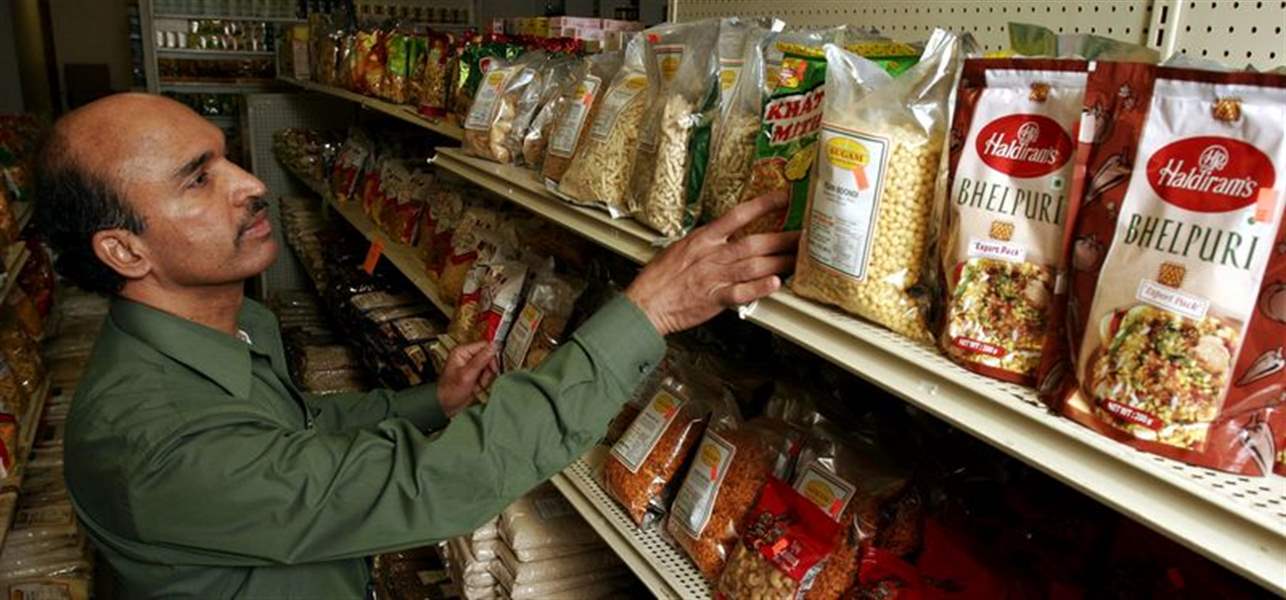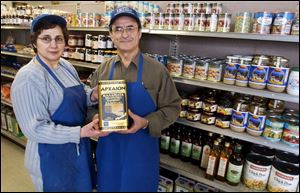
Feeding appetites for home
2/13/2005
Sankar Reddy straightens merchandise in his Sylvania Township store. He says 30 percent of his clientele is of non-Indian background.
wadsworth / blade

Sankar Reddy straightens merchandise in his Sylvania Township store. He says 30 percent of his clientele is of non-Indian background.
For a dozen or so grocers in the Toledo area, the ongoing battles among Kroger, Meijer, Farmer Jack, Giant Eagle, and others for supermarket supremacy mean very little.
That s because most of their customers don t care about self-checkout lanes, the lowest price, advertised specials, or video rentals.
What those customers do care about and what has kept a cluster of small ethnic grocery stores in Toledo not only strong, but growing is seeing a familiar face, hearing a foreign language, finding familiar foods, or making a cultural connection.
A major part of clientele are in landscaping or other jobs that bring them up here seasonally. Many don t speak English, said Maria Molina, owner of the Mi Mexican grocery store on Airport Highway in Toledo.
They feel comfortable because there s someone here who speaks Spanish and because they don t get anyone who speaks their language at Kroger or the big supermarkets.
The average customer may not notice them, but Toledo is home to at least 14 small grocery stores that serve clientele whose ethnic diversity includes Greek, Mexican, Italian, Indian, Pakistani, Korean, Asian, Middle Eastern, and Mediterranean cultures.
Some, such as Sofo Foods on Monroe Street in Toledo, are well-known retailers which have been in business several decades and occupy a distinct niche.
Others, like tiny Krishna s Groceries on Holland-Sylvania Road in Sylvania Township, are but a few years old and probably are unknown to most Toledoans.
About 30 percent of my clientele now is Americans, said Sankar Reddy, owner of Reddy Food n Spices, on West Central in Sylvania Township. They come for the dried fruit, pistachios, and raisins.
But the store caters mainly to Indian, Pakistani, and Asian customers, many of them professionals who have relocated to the United States, he said. They shop Reddy s two or three times weekly for its assortment of spices, freshly prepared curries, and fresh desserts that adhere to their traditional diets.
Lately, large grocery chains like Kroger and Meijer have begun to carry some ethnic-oriented foods that small grocers have carried for years. Nationally, nine out of every 10 grocery chains sell ethnic foods, according to the Food Marketing Institute trade organization.
But ethnic grocery stores nationally and there is no estimate of how many exist, although New York City alone is believed to have about 4,000 provide more than just products.
They play a key role for a population on a number of different levels, said Andrew Erlich, whose Hollywood, Calif., firm, Erlich Transcultural Consultants Inc., does cross-cultural market research and training on how to sell to various ethnic markets.
They are a key source of a very emotional connection to a previous life and culture for many people, he said.
According to the 2000 Census, about 5.5 percent of the Toledo population is Hispanic and 1 percent is Asian.
An ethnic grocery store is really a sense of home for some people, though home may have changed since they left it many years ago, Mr. Erlich explained. But in their mind, the sense of smell and the sense of taste are very strongly connected to their sense of family. They get those smells in the ethnic grocery.

Maria and Andreas Petros, whose store has been in business 30 years, offer Greek specialities and their own brand of prepared foods.
An ethnic-based small business like a grocery store also plays another key role, he said, of an entree into business in the United States and a source of income for a family and extended family.
Take Sofo Foods, for example. It was founded 55 years ago when Antonio Sofo and his son, Joe, saw the need for an Italian grocery store in Toledo.
There wasn t, per se, an Italian neighborhood, company chief executive Tony Sofo, who is Antonio s grandson, said. Italians were spread out throughout northwest Ohio, and, he said, My grandfather had a truck and he went door to door selling products.
Over time Italian food became a staple of the American diet, and Sofo s lost some of its connection to the ethnic community it served. At our old store [near downtown Toledo] it wouldn t be unusual to hear someone speaking Italian or Greek, but not so much anymore, Mr. Sofo said.
Sofo s, which has both retail and wholesale operations, is nationwide. However, most of Toledo s ethnic grocery stores typically draw from a small area.
Bill Bishop, a grocery industry consultant in Chicago, said well-run ethnic groceries can do well financially, even if they don t look like a 60,000-square-foot Kroger .
A small grocery typically has annual sales below $1 million, according to TradeDimensions, a grocery market research firm. But Mr. Bishop, of William Bishop Consulting, said such food stores are much more efficient than they look because the ownership is on premises, the staff is usually family, the wholesale supply arrangement is flexible, and inventory turns over more rapidly.
People ask, How in the world can these little, ostensibly inefficient stores survive and hold a significant portion of the market where we have this large modern supermarket? Mr. Bishop said.
Ethnic grocers often extend credit if needed and provide as much or as little of an item as a customer wants, services that are tough for other retailers to duplicate, he said.
The Toledo area s ethnic groceries rely mainly on distributors in Detroit or Chicago for general food items, and they obtain specialty items elsewhere, including from bakeries or produce distributors.
Andreas Petros and his family, owners of Petros Foods on Douglas Road, which focuses on Greek and Mediterranean foods, have run their store for 30 years. His customers come from Findlay, Fostoria, Lima, and downriver Detroit for his cheeses, olive oils, olives, and other fresh items.
One of things we give the customer is something that s a little bit different than the average store: personal service, he said. I try to give my customers the same brands some of the big stores have for less price, but part of my service is knowing my customers by name.
Still, Mr. Petros said business isn t what it once was. Big chains have added Greek foods, and many items are available in supermarket chains locally. Twenty-five or thirty years ago, this was the only place people could find feta [cheese]. Now, even Meijer has olives, he said.
I m working more hours now than ever before.
Atun Patel opened Krishna s Groceries three years ago after working in Detroit and sensing Toledo could use another Indian grocery.
With a clientele that is vegetarian, he doesn t stock meat, but has turmeric, cloves, and garlic, and other popular items valued for their health properties as well as flavor.
I thought there was potential for a market a lot of customers live near my store, Mr. Patel said. But after three years, he said, business is not that good, it s just OK.
Puneet Khurana, 25, a math and engineering student at the University of Toledo, said he likes the cultural connection that stores like Krishna s provide, allowing him to get movies or music from his native India. But when money is tight, he will shop at Kroger, Meijer, or wherever he can get what he needs for the lowest price.
If everything is the same, price, products, distance, I would probably go to Krishna s because I get a cultural connection there, Mr. Khurana said. But my first priority would still be price.
But the big chains frequently don t have the items spices and other foods he wants, which is why he often shops Krishna s.
Ms. Molina opened her Mi Mexican store almost two years ago, noticing that West Toledo had no ethnic grocery selling Mexican foods. She found the going rough at first and is only now breaking even.
But her store is developing a clientele mostly Spanish-speaking and she has worked hard to develop her ethnic retail niche.
The store carries El Milagro Tortillas, a preferred brand that few stores in northwest Ohio have. And she carries a variety of popular products she recalled from growing up on the Texas-Mexico border, including Coke in bottles, cheeses, chips, peppers, and pastries. She added a selection of Mexican music and magazines in Spanish that her customers requested.
It is very tough. It s a very time-consuming business, she said. I think everybody who s in this business probably has another job.
Contact Jon Chavez at: jchavez@theblade.com or 419-724-6128.